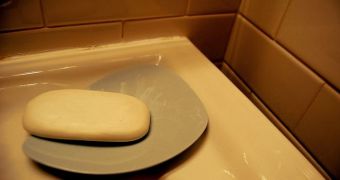A group of researchers in the United Kingdom announces the development of the world's first magnetic soap. The product features iron that is dissolved in liquid surfactants, which means that it can be controlled in whatever way is needed, simply by subjecting it to magnetic fields.
University of Bristol scientists say that the innovation could be used to create cleaning products that can be easily removed once they are applied. At the same time, it may be possible to incorporate this technology into oil spill cleanup methods.
Scientists first proved that this type of soap was possible during a neutron experiment conducted at the Institut Laue-Langevin (ILL), an international research center based in Grenoble, France. The iron-rich salts in the soap respond most efficiently to magnetic fields when they are inside a solution.
Experts have been meaning to use soap (surfactants) for cleaning up oil spills, or for industrial cleanup efforts, for many years. While the compounds are efficient at breaking down oils and other undesired residues, they cannot be easily removed from the system, and are a pain to clean up afterwards.
By creating surfactants that can easily be removed once their job is done, experts managing environmental disasters will no longer have to worry about pouring soap over spilled oil. Once the chemicals complete their tasks, they could simply be removed by a large magnet.
Details of the research effort and the methods the UB team used to create the magnetic soap are detailed in the latest issue of the international journal Angewandte Chemie. The science team was led by professor Julian Eastoe.
“As most magnets are metals, from a purely scientific point of view these ionic liquid surfactants are highly unusual, making them a particularly interesting discovery,” the expert explains.
“From a commercial point of view, though these exact liquids aren’t yet ready to appear in any household product, by proving that magnetic soaps can be developed, future work can reproduce the same phenomenon in more commercially viable liquids for a range of applications from water treatment to industrial cleaning products,” he adds.
In the experiments the team conducted, a magnet was placed inside a solution containing the new soap. For difficulty, an organic solution was placed above the mixture, and the magnet atop that layer. The magnetic soap particles had no difficulty penetrating the solution, and reaching the magnet.

 14 DAY TRIAL //
14 DAY TRIAL //